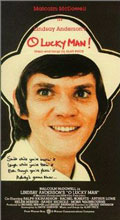
Directed by
Lindsay Anderson
166 minutes
Rated M
Reviewed by
Bernard Hemingway


O Lucky Man!
Although it is hard now to justify the running time, Lindsay Anderson’s picaresque satirical comedy is a classic of the anti-establishmentarian late 60s-early 70s era and offers a goodly slice of pleasure both in itself and as nostalgia
Malcolm McDowell plays Mick Travis whose name is the same as the character that McDowell played in Anderson’s other classic of the era, if…. (1968), although there is no narrative connection between the two. Mick is an ambitious, seemingly indefatigable optimist and a trainee salesman for the Imperial Coffee Company. By a felicitous coincidence he is given the North East of England as his territory and so he sets off to make his fortune by hook or by crook.
Scripted by David Sherwin, who also scripted if...., (as well as the belated Britannia Hospital, O Lucky Man! is an allegory of the times with England beginning to he infected by the American style of “winners are grinners” marketing hype. McDowell, with more than a hint of Alex from Kubrick’s A Clockwork Orange, a film which clearly had quite an influence on Anderson and Sherwin (indeed quite a few of the cast from that film appear here), perfectly embodies the spirit of glib opportunism that this kind of hucksterism really endorses as he sallies from one adventure to another, finally arriving at his idea of success only to be hurtled from its peak like the undeserving parvenu that he is. The cast which includes Ralph Richardson, Rachel Roberts, Arthur Lowe and Helen Mirren, many who play multiple roles, are excellent, the musical interludes from Alan Price and his band work well both as songs and as a kind of commentary on Mick’s adventures, is excellent and Anderson’s direction vibrant and inventive.
Unfortunately the script doesn’t have enough to sustain the running time and realistically should have been pruned. I couldn’t help but think of Lina Wertmüller’s contemporary comedy, Seven Beauties (1975). It follows the misadventures of an equally opportunistic individual but the dramatic structure is tighter and more focused and consequently the sense of character development better realized. This lack of rigour is reflected in the film’s ending which adopts a very standard way of drawing sprawling comedies to a close with an all-the-world’s-a-stage message rather than actually realizing its specific impetus but at least the way Anderson does it, it is not a complete puffery.
FYI: Indicative of the vagaries and inequalities of an actor's life, despite its impressive start McDowell's career never got any better and he gradually settled into a journeyman routine playing screen villains, whilst Helen Mirren, who has a small part here, has become one of the grand dames of the industry.
Show detailed review
Want something different?





